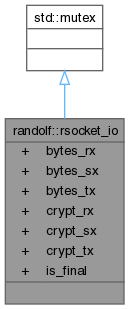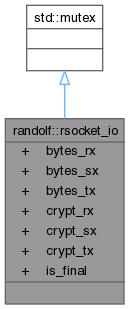Structure of socket I/O statistics tracked by rsocket. The reason this is a subclass of std::mutex is to ensure a thread-safe operation for the rsocket::~rsocket destructor when making a final copy of the internally-tracked I/O statistics using the pointer to this structure (if specified with the rsocket::net_io_final() method).
More...
#include <randolf/rsocket_io>
Public Attributes | |
| __uint128_t | bytes_hx |
| Quantity of unencrypted bytes harvested (received). | |
| __uint128_t | bytes_rx |
| Quantity of unencrypted bytes received. | |
| __uint128_t | bytes_sx |
| Quantity of unencrypted bytes spared (received, and remains in buffer). | |
| __uint128_t | bytes_tx |
| Quantity of unencrypted bytes transmitted. | |
| __uint128_t | crypt_hx |
| Quantity of encrypted bytes harvested (received). | |
| __uint128_t | crypt_rx |
| Quantity of encrypted bytes received. | |
| __uint128_t | crypt_sx |
| Quantity of encrypted bytes spared (received, and remains in buffer). | |
| __uint128_t | crypt_tx |
| Quantity of encrypted bytes transmitted. | |
| bool | is_final |
Should always be initialized to FALSE; reserved for the rsocket::~rsocket destructor to set to TRUE. | |
Detailed Description
Structure of socket I/O statistics tracked by rsocket. The reason this is a subclass of std::mutex is to ensure a thread-safe operation for the rsocket::~rsocket destructor when making a final copy of the internally-tracked I/O statistics using the pointer to this structure (if specified with the rsocket::net_io_final() method).
- Note
- To find out the total overall bytes received/transmitted, the sum of bytes_rx and crypt_rx, the sum of bytes_sx and crypt_sx, and the sum of bytes_tx and crypt_tx will provide this statistical information: When data is buffered (buffering is triggered by the rsocket::recvline() method), there may be occasions where data is spared (left behind), which is tracked in the bytes_sx and crypt_sx values. These values can be subtracted from the totals, if need be, as follows:#include <randolf/rsocket>std::unique_ptr<randolf::rsocket_io> io = r.net_io();__uint128_t total_rx = io->bytes_rx // Bytes received (unencrypted)+ io->crypt_rx; // Bytes received (encrypted)__uint128_t total_sx = io->bytes_sx // Spare bytes received (unencrypted)+ io->crypt_sx; // Spare bytes received (encrypted)__uint128_t total_hx = io->bytes_hx // Harvested bytes received (unencrypted)+ io->crypt_hx; // Harvested bytes received (encrypted)__uint128_t total_tx = io->bytes_tx // Bytes transmitted (unencrypted)+ io->crypt_tx; // Bytes transmitted (encrypted)Spare bytes are only applicable to received data statistics because buffering is only used to receive data.#include <randolf/rsocket>std::unique_ptr<randolf::rsocket_io> io = r.net_io();__uint128_t total_rx = io->bytes_rx // Bytes received (unencrypted)+ io->crypt_rx // Bytes received (encrypted)- io->bytes_sx // Bytes received (unencrypted spare)- io->crypt_sx; // Bytes received (encrypted spare)__uint128_t total_tx = io->bytes_tx // Bytes transmitted (unencrypted)+ io->crypt_tx; // Bytes transmitted (encrypted)
This statistical data is typically used in logging, and also in applications that keep track of I/O on a per-user basis.
- Version
- 1.00
- History
- 2023-Apr-30 v1.00 Initial version
- 2025-Aug-30 v1.00 Added tracking of rsocket::harvested() bytes received
Member Data Documentation
◆ bytes_rx
| __uint128_t randolf::rsocket_io::bytes_rx |
Quantity of unencrypted bytes received.
Referenced by randolf::rsocket::net_io().
◆ bytes_sx
| __uint128_t randolf::rsocket_io::bytes_sx |
Quantity of unencrypted bytes spared (received, and remains in buffer).
Referenced by randolf::rsocket::net_io().
◆ bytes_hx
| __uint128_t randolf::rsocket_io::bytes_hx |
Quantity of unencrypted bytes harvested (received).
Referenced by randolf::rsocket::net_io().
◆ bytes_tx
| __uint128_t randolf::rsocket_io::bytes_tx |
Quantity of unencrypted bytes transmitted.
Referenced by randolf::rsocket::net_io().
◆ crypt_rx
| __uint128_t randolf::rsocket_io::crypt_rx |
Quantity of encrypted bytes received.
Referenced by randolf::rsocket::net_io().
◆ crypt_sx
| __uint128_t randolf::rsocket_io::crypt_sx |
Quantity of encrypted bytes spared (received, and remains in buffer).
Referenced by randolf::rsocket::net_io().
◆ crypt_hx
| __uint128_t randolf::rsocket_io::crypt_hx |
Quantity of encrypted bytes harvested (received).
Referenced by randolf::rsocket::net_io().
◆ crypt_tx
| __uint128_t randolf::rsocket_io::crypt_tx |
Quantity of encrypted bytes transmitted.
Referenced by randolf::rsocket::net_io().
◆ is_final
| bool randolf::rsocket_io::is_final |
Should always be initialized to FALSE; reserved for the rsocket::~rsocket destructor to set to TRUE.
- See also
- rsocket::~rsocket()
The documentation for this struct was generated from the following file:
- randolf/rsocket_io

